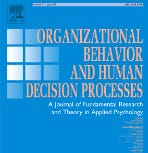New article in OBHDP (March 5th, 2025)
Pitch imperfect: How investors respond to entrepreneur disclosure of personal flaws
Lauren C. Howe, Jochen I. Menges
https://www.sciencedirect.com/science/article/pii/S0749597824000803
Put your best foot forward. Accentuate the positive. Play to your strengths. Whereas old adages emphasized that focusing on one’s positive qualities brings success, in recent decades, popular dialogues and scholarship increasingly encourage people to be authentic at work, including admitting their own negative qualities like personal weaknesses. Yet, when entrepreneurs seek investment, would it be wise for them to follow such advice and candidly disclose their flaws to potential investors? Research in entrepreneurial finance suggests that investors would rule out investment opportunities with any mere mention of flaws. Combining research in entrepreneurial finance with social comparison theory, the authors develop a conceptual model that outlines when disclosing flaws should elicit psychological closeness and result in investment. They distinguish between two types of flaws. Agency-excess flaws are shortcomings that indicate a person has excessive agency, thereby triggering a perception of superiority (e.g., being arrogant, a control freak, headstrong, or skeptical), whereas agency-deficit flaws are shortcomings that indicate a person lacks agency, thereby triggering a perception of inferiority (e.g., being insecure, disorganized, a pushover, gullible). The authors also consider the similarity in these flaws between entrepreneurs and potential investors. A field study and several experiments generally support their model. Disclosing agency-excess flaws does not generate closeness or elicit investment, even when investors possess the same flaw. Disclosing agency-deficit flaws can generate closeness and result in investment, but only among investors who possess the same flaw. This research contributes to the entrepreneurial finance literature by showing nuanced effects concerning how disclosing flaws impacts investments; the research also shows that similarities between entrepreneurs and investors do not always pay off.
P.S. if you can’t access the full-text let us (m-kouchaki@kellogg.northwestern.edu or mikebaer@asu.edu) know and we’d be happy to share a copy.


